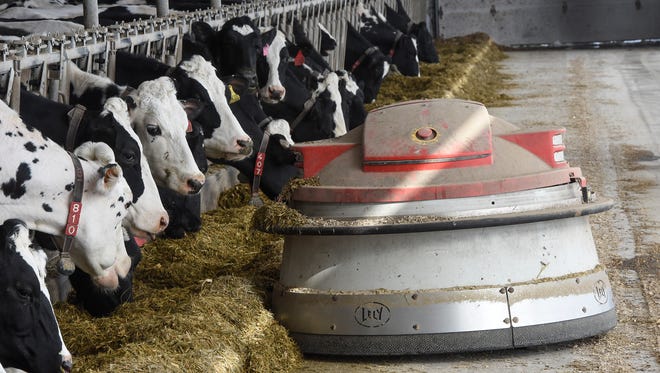As the number of farms decrease, what happens to the political influence that farmers have?
GREENWALD — Telephone numbers for U.South. lawmakers and pictures of cows and farmers were taped to the walls in a crowded room of the Greenwald Pub on Thursday, Jan. 30.
Small-dairy farmers gathered to talk about the crisis facing small farms equally well every bit potential solutions, including political action.
It'southward a tough fourth dimension for farmers in full general, and dairy farms have been hit peculiarly difficult.
Minnesota lost 810 dairy farms in the past iii years, including 315 in 2019.
That amounts to a 25% subtract in dairies in three years, co-ordinate to Minnesota Section of Agriculture data shared by Minnesota COACT, which hosted Thursday's meeting along with the Land Stewardship Project, the National Farmers Arrangement, the Sustainable Farming Association and the farmers unions of Morrison and Todd counties.

Minnesota Attorney General Keith Ellison was at the meeting and expressed interest in cracking down on price fixing in agriculture and problems with cooperatives.
At that place are fewerthan two,500 dairy farms in the state now. The dairy farms that take closed had fewer than 200 cows.
"That's falling off a cliff. That's not general slide down," Richard Levins, professor emeritus of applied economics at the Academy of Minnesota, told the farmers. "I wish things were amend, and unfortunately they don't become better by themselves."
Levins proposed something to level the playing field chosen the Dairy Subcontract Construction Management Plan. The plan would increment the cost of milk for the starting time one 1000000 pounds of production each month and decrease the price after that.
Levins talked almost what happens to the dairy market when large dairies, such as farms with 5,000 cows, enter the market every bit demand for milk is steady or dropping.

"This 'room for everybody' argument doesn't work and so well in dairy," Levins said. "We're playing musical chairs. Only when that five,000-cow dairy comes in, we don't accept away one chair, we have abroad 50 chairs."
Farmers, forth with the Land Stewardship Project, are asking the state to put a moratorium on dairies with more than 1,000 animals. It's one of a number of ideas presented to help the farm crisis. The listing includes five proposals for Minnesota legislators and six proposals for Congress.
RELATED:Small dairy, large tech: Melrose farm has barn of the time to come

Carrie Redden connected with the request to put a moratorium on big dairies.
Redden and her husband began milking cows a yr and a half ago. They have 50 cows that produce organic milk in Chokio, near Morris, she said. And in that location are many other cows near their farm, equally they're "in the land of the mega dairy."
"I'1000 actually concerned about the big dairies, what the mega-dairies are doing to the marketplace and the environment," Redden said.
She filled out postcards, along with other farmers at the meeting, to send to U.South. Sens. Amy Klobuchar and Tina Smith and Congressman Collin Peterson.
RELATED:Sen. Tina Smith touts benefits of merchandise deal for Minnesota dairy farmers
"Farmers, we accept to take action," said Joe Neaten, president of the Minnesota chapter of the National Farmers Arrangement. "Not tomorrow. Not next week. Today."
6 demands of Congress
Hither are the six demands of Congress discussed Thursday in Greenwald:
- End corporate mega-mergers with a moratorium on pending corporate ag mergers and other steps related to anti-trust in agriculture.
- Gear up a supply management system for grain.
- Implement short-term relief for dairies and long-term back up for pocket-size and mid-size dairies.
- Set limits on federal subcontract subsidies and tie them to stewardship.
- Require county-of-origin labels.
- Offering forty-yr fixed loans through the Farm Service Agency for minorities, women and veterans entering farming.
v demands of Minnesota leaders
And here are the five demands of state leaders:
- Double the number of advocates in the Minnesota Farm Advocates programme and fund the Farmers' Legal Action group.
- Use the ability of the attorney general's function to investigate farmer-owned cooperatives that aren't following through on their original purpose.
- Pass a policy to help farmers restructure loans.
- Put a moratorium on dairies with more than 1,000 cows until h2o and market impacts are addressed.
- Expand public health intendance coverage to help farmers and rural communities with poor access and unaffordable costs.
Story continues below
Attorney Full general Ellison told farmers Thursday he wants to help them keep their farms and prosper. Ellison said he is interested in cracking down on price-fixing and anti-competitive behaviors in agribusiness.
"It's not legal to engage in price-fixing schemes," Ellison said.
Organizers of Th's result encouraged farmers to telephone call lawmakers, send postcards, submit their thoughts on the Land Stewardship Project's Farm Crisis Statement and share the Farm Crisis Statement with other farmers.
There's another statewide coming together of farmers and rural leaders calling for policy change Feb. 29 in Mankato.
RELATED:Clearwater farmer, distributor raises beef to improve soil and help planet
Nora Hertel is the government watchdog reporter for the St. Cloud Times. Accomplish her at 320-255-8746 or nhertel@stcloudtimes.com. Follow her on Twitter @nghertel.
Support local journalism. Subscribe to sctimes.com today.
Source: https://www.sctimes.com/story/news/local/2020/01/31/small-dairies-mobilize-farm-country-crisis-greenwald-land-stewardship-policy-congress-minnesota/4566018002/
0 Response to "As the number of farms decrease, what happens to the political influence that farmers have?"
Post a Comment